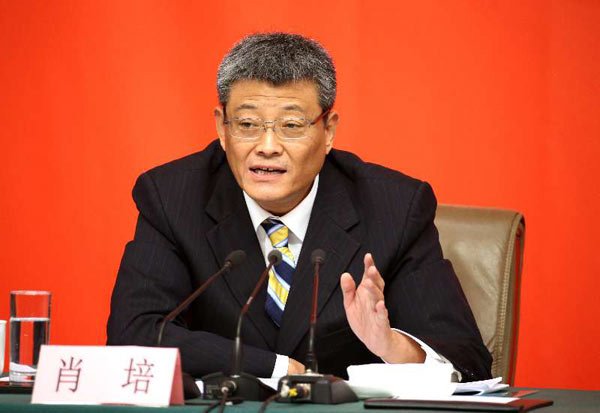
Xiao Pei, deputy secretary of the Central Commission for Discipline Inspection of the Communist Party of China, answers questions from journalists at the news conference, on Oct 26, 2017. (Photo by Feng Yongbin/China Daily)
The establishment of supervisory commissions at various levels and their working together with the disciplinary authorities of the Communist Party of China are not to enlarge the power of discipline inspectors but to make anti-graft efforts more concentrated and standardized, a senior discipline official said on Thursday.[Special coverage]
"The establishment of supervisory commissions is to integrate anti-corruption resources and power separated in different departments, such as in corruption prevention and prosecuting authorities, to form a joint force," said Xiao Pei, deputy head of the Central Commission for Discipline Inspection, the Party's top discipline watchdog.
He made the remark at a news conference while explaining the report made at the beginning of the 19th CPC National Congress, which ended on Tuesday.
General Secretary of the CPC Central Committee Xi Jinping said while making a report to the congress on Oct 18 that the Party must strengthen checks on and oversight over the exercise of power and that supervisory commissions at the national, provincial, city and county levels will be set up.
"A national supervision law will be formulated. Supervisory commissions will be given responsibilities, powers and means of investigation in accordance with law," Xi said. "The practice of shuanggui will be replaced by detention."
Shuanggui is a form of intraparty disciplinary action that requires a Party member under investigation to cooperate with questioning at a designated place and time.
Xiao said many investigatory measures employed by disciplinary inspectors are expected to be written into the law and better regulated.
"The national supervisory commission is not a judicial body. Its duty is to supervise, investigate and handle major duty-related crimes such as corruption," Xiao said.
Xiao said the law will include strict regulations on approval procedures, conditions for use and time limits for detention. Rules on how to ensure the security and medical care of those questioned will also be written into the law, he said.
"That will make our anti-corruption drive more codified," he said.
At the end of last year, a supervisory commission pilot program started in three provincial-level regions-Beijing, Shanxi and Zhejiang. In June, the first draft of the national supervision law was submitted to the top legislature for first review.
Zhang Shuofu, head of Beijing's Discipline Inspection Commission, said that the capital has completed the trial period and all public servants in the capital have been brought under oversight.
"We've put 997,000 civil servants on the supervision list, 787,000 more than before," he said.
Supervisory commissions at the city level and at district levels have been set up in Beijing, he said.
"We've issued 36 rules to coordinate work among the supervisory commissions, judicial and law enforcement departments, ensuring each move is based in law," he said.
Li Chengyan, head of Peking University's Center for Anti-Corruption Studies, said supervisory committees have been established to upgrade the fight against graft and make it more standardized.
Zhu Lijia, a professor at the Chinese Academy of Governance, said it is the time to extend the pilot program across the country, and he expects clearer rules on the operation of the supervisory system.


















































